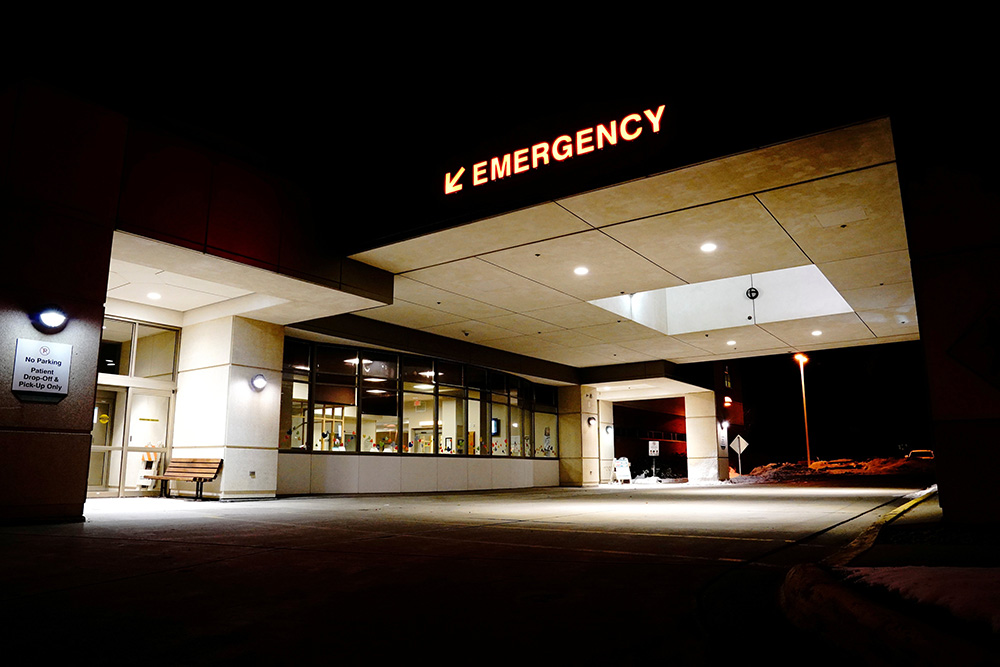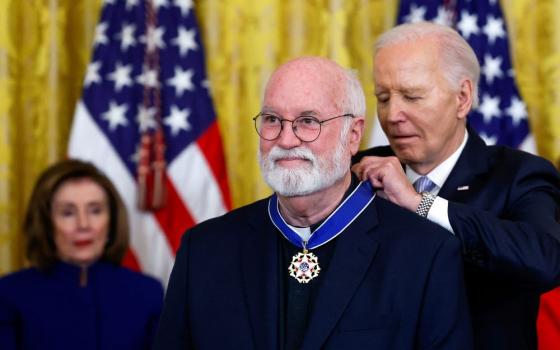
A file photo shows the entrance of an emergency room. The U.S. Supreme Court weighed a potential conflict between Idaho's abortion ban and federal law governing emergency health care heard during oral arguments April 24, 2024. (OSV News/Reuters/Bing Guan)
The Supreme Court on April 24 weighed a potential conflict between Idaho's abortion restrictions and federal law governing emergency health care.
Supporters of Idaho's law argued it makes appropriate exceptions for emergency circumstances, while opponents argued that the law runs afoul of federal requirements to provide stabilizing care to pregnant women experiencing adverse effects in emergency rooms.
The federal law in question, the Emergency Medical Treatment and Labor Act, or EMTALA, obligates doctors and hospitals to attempt to stabilize both mother and unborn child in an emergency.
During oral arguments, justices on the court's perceived liberal wing seemed to back the Biden administration's argument that the federal law would supersede the state law, while the conservative justices appeared more skeptical of a conflict between them.
Justice Samuel Alito noted the presence of the term "unborn child" in the EMTALA statute, asking, "Isn't that an odd phrase to put in a statute that imposes a mandate to perform abortions?"
But Solicitor General Elizabeth Prelogar argued there is a conflict between Idaho law and EMTALA, suggesting the former makes a provision for possible maternal death but not for other adverse outcomes.
"In Idaho, doctors have to shut their eyes to everything except death," Prelogar said. "Whereas under EMTALA, you're supposed to be thinking about things like, 'Is she about to lose her fertility? Is her uterus going to become incredibly scarred because of the bleeding? Is she about to undergo the possibility of kidney failure?' "
Advertisement
The Biden administration has sought to use the 1986 emergency health care law to require hospitals to perform emergency abortions in states that have restricted abortion following the June 2022 Supreme Court decision in Dobbs v. Jackson Women's Health Organization, which overturned the high court's previous abortion precedent.
The administration has argued that doctors must perform abortions when a woman's life is in jeopardy from the pregnancy under EMTALA, while others argue that law requires stabilizing care be administered to both mother and unborn child, as gestationally appropriate.
Idaho Attorney General Raúl Labrador said in a statement the Biden administration's "radical interpretation of federal law is nothing more than a lawless disregard for Idaho's right to protect life."
"Idaho's Defense of Life Act is perfectly consistent with the federal Emergency Medical Treatment and Active Labor Act, which provides explicit protections for 'unborn children' in four separate places," Labrador said. "But the Biden administration is trying to use one life-affirming law to invalidate another."
In a statement issued prior to oral argument, Leo Morales, executive director of the ACLU of Idaho said, regarding the amicus brief his group filed, "We are seeing that banning abortion in Idaho to score easy political points in a state known for its tolerance of far-right extremists has devastating effects on the health care system and pregnant patients."
"We are confident the U.S. Supreme Court can appreciate the gravity that this decision will have on all Idahoans, and urge the Court to recognize the federal law that protects the rights of all individuals to emergency treatment," Morales said.
But Dr. Ingrid Skop, a board-certified OB-GYN who is senior fellow and director of medical affairs at Charlotte Lozier Institute, said in an April 24 statement, "I have practiced under EMTALA over my 30-year career. The law has never been confusing to me or my obstetric peers, because it calls for the protection of the health of both mothers and their unborn children."
Skop added that Charlotte Lozier Institute's amicus brief in the case before the high court outlines that position.
"Like approximately 90% of obstetricians, I do not perform abortions, yet I have always been willing and able to intervene if a pregnancy emergency threatened my patient's life," she said. "Every state pro-life law allows a physician to use his or her medical judgment to determine how to protect a mother's life in an emergency. Any attempt to use federal law to force physicians to perform abortions is not only unnecessary and coercive but distracts them from their oath to do no harm."










